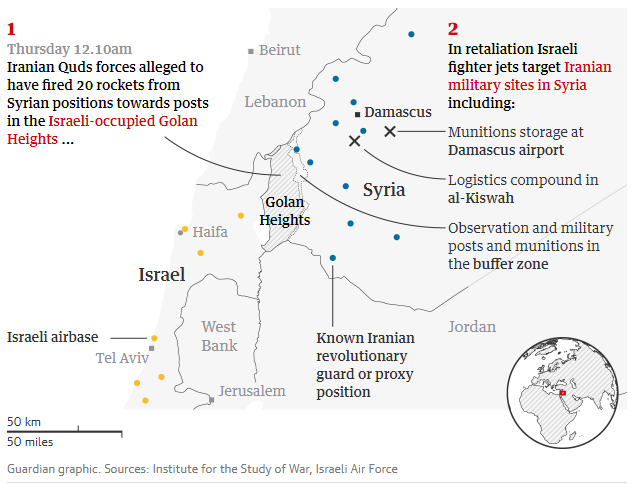
Israel and Iran have been urged to step back from the brink after their most serious direct confrontation, with Israeli missiles being fired over war-torn Syria in a “wide-scale” retaliatory attack many fear could drag the foes into a spiralling war.
Hostilities erupted after Donald Trump’s announcement on Tuesday that the US was pulling out of the 2015 Iran nuclear agreement, a move that infuriated Tehran and raised tensions across the Middle East.
Already roiling from civil wars in Syria and Yemen, in recent months the region has seen Israel and Iran increasingly warn of an impending conflict.
Both the UN secretary general Antonio Guterres and the EU’s foreign policy chief Federica Mogherini appealed for restraint.
“The Secretary-General urges for an immediate halt to all hostile acts and any provocative actions to avoid a new conflagration in the region already embroiled in terrible conflicts with immense suffering of civilians,” a spokesman for Guterres said.
In a phone call to Israeli prime minister Benjamin Netanyahu, Theresa May condemned the Iranian rocket attacks, but called for “calm on all sides.”
On Thursday, Israel claimed it hit nearly all key Iranian military targets in Syria during strikes launched in response to a rocket attack on its troops in the occupied Golan Heights it blamed on Iran.
The alleged Iranian barrage just after midnight, which Israel said failed to hit its targets, and the latter’s extensive response appeared to be the most significant encounter between the enemies.
It would be the first time, if confirmed, that Iran has fired rockets directly at Israeli forces in a conflict that for years has been fought through proxies, such as the Lebanese group Hezbollah.
Israel’s response was the biggest strike in Syria since the 1973 Yom Kippur war. The confrontation follows a months-long shadow war campaign during which Israel has been accused of repeated air assaults in Syria, the latest of which was reported on Tuesday night.
The Israeli military said it had hit the logistics headquarters of the Iranian Quds forces and military compounds south, north and east of Damascus, including a munition warehouse at the capital’s international airport.
Observation and military posts near the occupied Golan Heights were also hit, while Syrian air defence engaged its anti-air batteries to intercept Israeli missiles.
The Israeli defence minister, Avigdor Lieberman, told a security conference: “We hit nearly all the Iranian infrastructure in Syria … They need to remember the saying that if it rains on us, it’ll storm on them. I hope we’ve finished this episode and everyone understood.
“We don’t want an escalation, but won’t let anyone attack us or build an infrastructure to attack us in the future.” Hesaid Iran had also been attempting to bring anti-aircraft systems close to the Israeli border.
The occupied Golan Heights has been on high alert since Trump announced he would withdraw from the Iran deal.
Israeli fighter jets struck dozens of Iranian targets within Syria overnight including weapons storage and intelligence centres

The Syrian Observatory for Human Rights, which monitors the conflict through a network of sources, said the Israeli strikes had killed at least 23 fighters, including government troops and allied forces. It did not say if Iranians were among the dead.
“The rules of the game are worked out by trial and error, by push and shove. The pushing and shoving has become more intense,” said Heiko Wimmen, of the International Crisis Group. “We are getting closer to the brink.”
A White House statement condemned Iran’s “provocative rocket attacks” and said the US supported Israel’s right to defend itself. It said Iran’s Revolutionary Guards bore “full responsibility for the consequences of its reckless actions.”
Russia said the Israeli strikes marked a dangerous escalation and urged both Israel and Iran to avoid provoking each other.
The French president, Emmanuel Macron, discussed the Middle East in a meeting with the German chancellor, Angela Merkel, who called for “level-headedness”.
“We know that we face an extremely complicated situation here. The escalation of the last few hours shows it is truly a matter of war and peace, and I can only call on all involved to exercise restraint,” she said.
Moscow, which supports the Syrian president, Bashar al-Assad, said 28 Israeli warplanes took part in the raid and 70 missiles were fired. Israel said it had notified Russia before the strikes began.
The Syrian capital was shaken with explosions in the early hours of Thursday as jets flew overheard. Residents posted videos online of what appeared to be air defence missiles running bright streaks through the sky and reported loud noises rocking their buildings.
Syria’s state news said Damascus had intercepted dozens of missiles, but several had hit radar and other military posts.
Israel said about 20 rockets were fired from an Iranian-operated launcher at its forces in the Golan Heights and either fell short of their targets or were intercepted.
Tensions between Iran and Israel rose in February when Israel said it had shot down an Iranian drone in its airspace. Since then, Syria and Iran have not retaliated to what they claimed were multiple Israeli attacks, although Israel’s intelligence community had braced itself for a response.
Iranian authorities were muted in Tehran on Thursday, neither confirming nor denying the reported rocket strike. State-run Press TV said Syrian air defences had “intercepted several rockets fired from Israeli aircraft after the Tel Aviv regime targeted Syrian army positions in the occupied Golan Heights”.
Hossein Salami, second in line of command of the Revolutionary Guards, boasted about Iran’s military prowess on Thursday without mentioning the confrontation, saying Tehran had “gained such immense power and deterrent capabilities that the enemies would not come to think of taking military action against the country”.
Throughout the Syrian war, Israel has carried out dozens of airstrikes, mostly on weapon convoys believed to be heading for Hezbollah fighters, but the overnight raids were the most intense to date.
Ref.: https://www.theguardian.com/world/2018/may/10/israel-has-hit-nearly-all-iranian-infrastructure-in-syria-military-claims
Related


